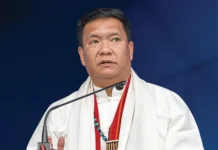ITANAGAR, 24 Feb: The Great Backyard Bird Count (GBBC) is an annual event that brings bird enthusiasts, students, and nature enthusiasts together to watch and count birds they see around the places where they live, work, or study.
It is a free, fun and easy event that anyone can participate in. This year’s event was celebrated from 17-20 February. This is a free, fun and easy event, open to everyone, regardless of age or experience. For Indian birdwatchers, it was the 11th year of participation in the GBBC.
The 2023 edition of the event saw India emerge second among 190 participating countries. Over the four days of the GBBC, Indian birdwatchers uploaded over 46,000 checklists and 1,067 bird species to eBird – an online platform to record bird observations.
Birders from 35 states and union territories participated in the GBBC.
While Kerala recorded the highest number of checklists (9,786 lists), West Bengal reported the highest number of species (489 bird species). Tripura, Arunachal Pradesh, Chhattisgarh, Odisha, Uttar Pradesh, Nagaland, Bihar, Jharkhand, and Manipur enthusiastically participated in this year’s GBBC. (Click here for preliminary report to know more.)
“Birdwatchers of Bihar have worked hard together to make GBBBC a success, and the results show that more species and checklists have been recorded this year, compared to the previous year, and it’s safe to say that this event has stoked their passion for birds,” said Rahul Kumar, a naturalist and birdwatcher from Bihar.
“Bihar’s diverse habitats are home to some of India’s most beautiful and fascinating bird species, and
it’s heartening to see so many people taking an active interest in their bird documentation.”
“The event was significant as it fascinated students to learn more about the birds and to take initiative to observe them,” said Vaishnavi Padigala, second year environmental science undergraduate from Fergusson College.
She added: “Personally, the one thing that I most enjoyed was trying to identify calls. This experience was truly fun and pleasing to my ears.”
Events like GBBC provide impetus to civil society to study bird populations, distribution, and migration patterns, as well as their local status. The data contributed by citizen scientists are also used by scientists and conservationists to better understand and protect bird species.
India’s strong participation in the event reflects the growing interest in bird-watching and conservation in the country, and highlights the rich biodiversity of the Indian subcontinent.



